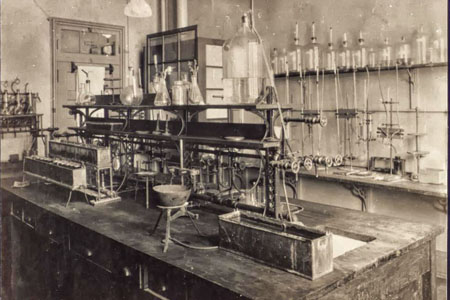Maryse Lassonde, O.C., C.Q., MSRC, psychologist, neuropsychologist, psychophysiologist, professor emeritus (born 5 January 1954 in Saint-Jean-sur-Richelieu, QC). She specializes in child neuropsychology, is a professor and is an internationally renowned researcher. She has indicated that it was her father’s brain cancer that drew her to neuroscience. She is dedicated to uncovering the secrets of the brain, promoting science and encouraging women to study it.

Education
Maryse Lassonde has a Bachelor in Psychology from the Université de Montréal (1974) and a Doctorate in Neuroscience from Stanford University (1977). She realized that neuropsychology, or the study of the relationship between the brain and behaviour, was limited to adult research until the 1970s, and thus set out to explore the subject in greater depth for her children. Her research work on children and its clinical applications helped to foster the emergence of this new discipline both in Quebec and abroad.
Did you know?
Neuropsychologists are specialized psychologists who can make neuropsychological diagnoses; they must be recognized by the Ordre des psychologues du Québec and hold an accreditation of training in the evaluation of neuropsychological disorders.
Career and Research Highlights
Back in Quebec, Maryse Lassonde taught neuropsychology at the Université du Québec in Trois-Rivières (1977-1988). (See also Université du Québec Network.) She then taught in the Department of Psychology at the Université de Montréal (1988-2013). In Trois-Rivières, she founded the Neuropsychology Unit at the Hôpital Sainte-Marie.
One of her students was interested in agenesis of the corpus callosum, a malformation or lack of development of the structure, made up of millions of nerve fibers, that transfers information between the right and left hemispheres of the brain. This was Lassonde’s first and main area of research.
Her work in this field led her to Hôpital Sainte-Justine where she was focused on the neuropsychology of epilepsy in children. She studied the cognitive effects of the condition, as well as infantine congenital anomalies. Initially, she was interested in cerebral reorganization, following neurosurgery in young children with epilepsy (resections, focal destructions, callosotomies, hemispherectomies, etc.) and on concussions in young National Hockey League players. The NHL concussion research enabled her and researchers at McGill University to develop one of the first research programs on the electrophysiological repercussions of sports concussions athletes. Because of her interest in young hockey players, she became a neuropsychological consultant for the Montreal Canadiens (1998-2012).
Student and first author Louis de Beaumont, along with six other coauthors including Lassonde, published an unforgettable study on the effects of concussions in the respected journal Brain entitled: Brain function decline in healthy retired athletes who sustained their last sports concussion in early adulthood (2009). It emerged that 30 years after a single concussion, memory loss and distraction impairment could still be observed. It also appears that a first concussion in a given subject can lead to a second, that a second is five times more likely to lead to a third, and that these conditions can predispose to Alzheimer’s or even death.
At the request of the Université de Montréal, Lassonde created Canada’s first doctoral training program in clinical neuropsychology research/intervention, accredited by the Canadian Psychological Association, making her the driving force behind clinical neuropsychology in Canada. She mentions in the journal Phsychologie (2009) that Montreal alone received 50% of all neuroscience research grants in Canada.
From 2001 to 2003, Lassonde held a Canada Research Chair in Clinical Neuropsychology. This enabled her to set up a brain electrophysiology and optical imaging laboratory at the Centre de recherche du Centre hospitalier universitaire Sainte-Justine. The sophisticated equipment at her disposal enabled her to check brain response not only in healthy babies, but also in premature infants, epileptics and cancer patients. Innovative non-invasive brain imaging techniques, which allowed her to study the brains of newborns, resulted in, among others, the discovery of a specific brain wave, highly pronounced in response to their mother’s voice.
Neurosurgeons rely on her and her team to locate and safeguard language and motor areas during brain surgery.
Professional Associations
Maryse Lassonde is involved in several organizations, ministerial committees and governing councils. From 1993 to 1994, she was the president of the Association francophone pour le savoir (ACFAS), the Conseil supérieur de l’éducation and the Conseil de la langue française.
From 2008 to 2011, she was president of the council of the National Order of Québec. From 2012 to 2018, she was the scientific director and member of the Fonds de recherche du Québec - Nature et Technologies (FRQNT), and from 2015 to 2017, she was president of the Royal Society of Canda.
Publications
Maryse Lassonde is the coauthor of seven books (including Callosal Agenesis, A natural Split-Brain? (1994)) and the author of over 300 articles and scientific papers.
Personal Life
Maryse Lassonde has two daughters and four grand children.
Awards and Distinctions
Maryse Lassonde’s professional life was defined by numerous awards and distinctions:
- Fellow, Canadian Psychological Association (1994)
- YWCA Women of Distinction award in science (1996)
- Member of the Royal Society of Canada (1997)
- Marcel-Vincent Award from the Association francophone pour le savoir (1998)
- Knight of the Order of Québec (1999)
- Noël-Mailloux Award from the Ordre des psychologues du Québec (2001)
- Emeritus member of the Association canadienne francophone pour le Savoir (2006)
- Adrien-Pinard Award, Société québécoise pour la recherche en psychologie (2008)
- Member of the Canadian Academy of Health Sciences (2010)
- Officer of the Order of Canada (2012)
- Professor emeritus of the Université de Montréal (2013)
- Armand-Frappier Award, Prix du Québec awarded by the government of Quebec (2023)

 Share on Facebook
Share on Facebook Share on X
Share on X Share by Email
Share by Email Share on Google Classroom
Share on Google Classroom







